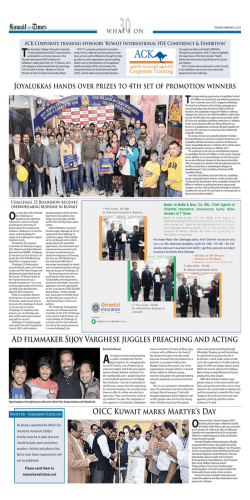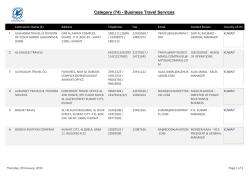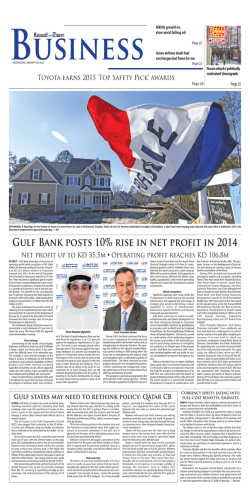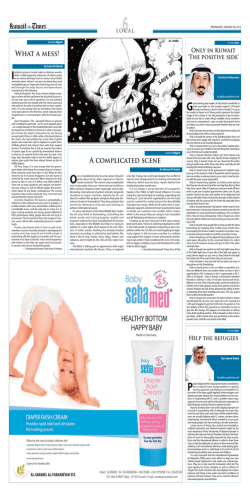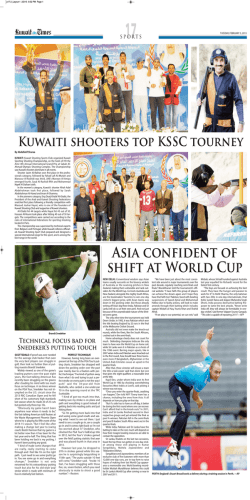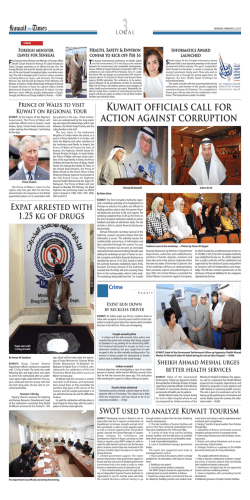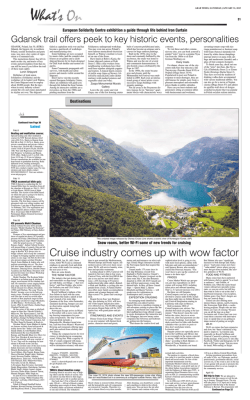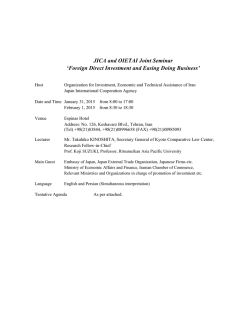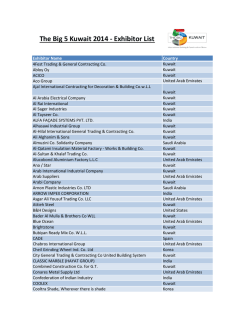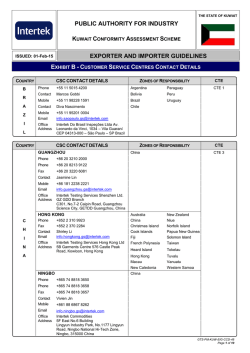
AA-Postscript 2.qxp:Layout 1
TUESDAY, FEBRUARY 3, 2015 LOCAL kuwait digest kuwait digest Reconsider domestic and foreign policies Nothing comes after ‘tet’ Democracy By Shamlan Al-Essa By Hassan Al-Essa he quick changes in the Arab region require that Gulf countries reconsider their domestic and foreign policies to overcome the dangers these countries are facing. Among the most important challenges that face our country is the quick rise of the Iranian influence in the region after the fall of Yemen and Syria, Iraq and Lebanon being under Iran’s mandate. The question what are the expected Gulf polices towards the accelerating developments in Yemen? And do the Gulf countries have a joint view towards what is going on in Yemen? And where the Gulf countries agree with Iran and where they differ? Especially that there are Gulf countries that have close ties with Iran. The Gulf countries can form an effective Arab axis to contain the Iranian expansion in the region, especially that Iran uses the religion and sect factor and support of the minorities in the Arab region to strengthen its position, which created crises between Gulf countries and Iran, because the Gulf countries consider Iran’s interference in their domestic affairs a violation of these countries’ sovereignty. The Iranian policy in the region is contradictory and double-faced, because at the time when Iranian President Hassan Rouhani confirms his efforts to create positive atmosphere and improve his relations with neighboring Gulf countries, we find him attack Saudi Arabia and UAE for their support of Saddam Hussein during his war with Iran! While the King of Bahrain Hamad bin Essa Al-Khalifa sent a congratulatory letter to the Iranian president on the anniversary of the Iranian revolution victory in 1979, the Iranian Revolution Supreme leader Ali Khamenei received a group of Bahraini opposition during which he blessed their power and steadfastness! The Arab Gulf countries attempted to protect themselves against the Iranian influence expansion through signing strategic alliances with the US, and among the strange ironies is that the American ally does not want to face Iran now, rather its entire concentration is on fighting the expansion of the Islamic State (Daesh) in the region. The latest visit by American president Barack Obama along with a large American delegation to extend condolences to the Saudi leadership included political talks over several issues, including the war against terrorism and the latest developments in Yemen. We in the Gulf should understand that the American stand towards Iran is because of a change in the structure of strategic American interests and its work towards grabbing the alternatives that follow the reconciliation with Iran and reduce the burden of confronting it, more than reflecting a victory of any side in the long struggle between them. The interests of the United States in the region are limited to Israel’s security after the US dropped the policy of managing change in the region and the American involvement in the region was reduced. The Arab Gulf countries are required to strengthen the domestic front by following a reform policy that concentrates on the citizenry principle to bring the people closer to their rulers and repel all foreign attempts to expand into our countries. ccusations of forgery and manipulating laws with the intention of profiteering from a business are very simple and normal. However, assuming it is illegal, nobody cares about the argument that took place between two lawmakers in parliament three days ago, where one of them accused the other of registering some stores he owned in his wife’s name and not paying their rent, and the other argued that he ‘was not one of those who would forge a report in a tender or forensic reports about drug abuse’! Well, regardless of this argument that ended by using a genuine Kuwaiti dialect term ‘Tet....tet’ (which is usually used to scare away cats intruding or trespassing into the house), none of their colleagues, Cabinet members or even their voters actually care about such accusations that may prove true or are mere provocative talk affected by childhood memories and arguments. People in Kuwait and in other countries witnessing similar public property and fund violations and lenient administrations are used to hearing news about major crimes of abuse of powers, profiteering and bribery, which all drain public funds and most probably reach dead ends due to mistakes in imposing the law or lack of earnestness in tracking down the culprits, especially when this tracking is limited to symbolic nominal measures where the stardom of some officials is splashed in newspapers as if corruption and looting public facilities is their prime cause, or when such cases are closed because the culprits managed to find their way out of the country to wrap up the whole story with the conclusion that those with authorities did their duties according to the law and we should stop asking them for more. Accordingly, this ends another silly act of our official play. What does it mean to forge a tender or a rent stores in a wife’s name by this or that lawmaker when compared to endless stories about mightier hotshots who remained in office for scores of years and served under many ministers who considered them (the hotshots) above suspicion? Those hotshots really knew how to mislead the law and justice that has become actually, not symbolically, blind as indicated by its famous statue. When this blindness happens, justice no longer sees VIPs and their crimes but it strongly punishes some young people for ‘tweeting’ out of the flock and in disobedience. VIPs might have learnt how to butter and tidy up everyone when they were in office according to the principle of ‘charity cuts the tongue’. Well, a few days ago, the local press shyly reported the story of one of those hotshots as one of so many in a country where charity does cut tongues, who managed to escape like so many before him who fear nothing nor the term ‘tet’ because they knew long ago that nothing comes after ‘tet’! —Translated by Kuwait Times from Al-Jarida A T Al-Anbaa kuwait digest What about corruption and arms deals? By Dr Bader Al-Daihani W hile talking about how to handle the predicted deficit and excessively focusing on social subsidies and salaries, namely those of small employees and retirees, both the government and its financial advisor - the International Monetary Fund have been avoiding discussing or even referring to certain expenses despite their significance in handling the financial deficit, such as expenses of huge arms deals and those resulting from political and institutional corruption. The arms race and facilities related to it have been draining GCC states’ budgets, as a single huge deal costs what equals funds spent on necessary social needs for years to come, taking into consideration that social expenditure is part of a state’s public expenditure as well as the fact that the sole beneficiaries of such deals are weapons manufacturers, their local agents and some senior bureaucrats who get huge commissions for facilitating signing the contracts. According to an Al-Shall report on Sept 28, 2013, Kuwait’s military spending in 2012 was $6.021 billion (KD 1.686 billion), with an annual increase of about 10.2 percent. In addition, one can talk about political corruption forever. Examples of abuse of powers and public positions to achieve personal gains and illegal wealth made by using public funds in profiteering, political deals and custom-tailored tenders are endless, not to mention the billions-worth foreign transfers and bank deposits, the high cost the state budget endures as a result of giving away state property and lands very cheaply on longterm contracts in very significant spots like the seafront extending along the Kuwaiti coast from north to south, Shuwaikh industrial area and Al-Rai (that all of a sudden and by powers of influential people turned into an investment and commercial area) and agricultural land holdings and ranches that are mainly being allocated for political reasons for long periods and contracts without changing the lease value to match that of the market. (Some of those lands still cost the same per square meter in rent since the 1960s!) Therefore, treatment of the predicted deficit must be comprehensive, radical and fair because ignoring the huge arms deals about which we never have enough details about why we need them and political and institutional corruption issues that have been draining public funds, while at the same time pursuing a few dinars in the pockets of small employees and people with limited and small incomes would mean the continuation of extreme social bias in managing the state budget. —Translated by Kuwait Times from Al-Jarida kuwait digest Human rights and Kuwait in Geneva By Mudaffar Abdullah T o start with, sentencing a parliamenand bureaucracy that has caused considertary election candidate and a number able retreat in development. For instance, of his campaign assistants to prison for Hungary recommended establishing a spetaking part in vote-buying is considered a cial national organization for human rights, substantial development after long experiwhich is a good idea to place the whole ences of lack of evidence. The grace given to issue in the hands of only one body instead Kuwait to prepare its reply for the compreof scattering its responsibility amongst the hensive human rights periodic review sesministries of interior, social affairs, foreign sion was over last week in Geneva and will affairs and justice. be followed by another session within four Notably, this idea has been kept in drawmonths for NGOs. ers of the parliamentary human rights comWell, to briefly define this mechanism mittee since 1996 and the government has approved in 2006, it is part of the work of not taken any positive moves towards the UN Human Rights Commission which achieving it so far, which caused a lot of allows member states to provide a 20-page embarrassment with international organizareport describing tions because the minhuman rights in their istries mentioned Following this issue for above are too busy to territories - a 10 page report with recommengive due proper care years, I noticed the dations on human and attention to human progress of human rights rights. rights and a 10-page report including a sumDespite progress in Kuwait is subject to mary of all information made in some fields public administration like ranking Kuwait provided by NGOs. HRC is responsible for periproblems and bureau- 46th in the internationodically reviewing the al human development cracy that has caused files of 48 countries index in 2014 comevery four years. considerable retreat in pared to 63rd in 2011, What has been said Kuwait still has many development. about Kuwait? What are duties and the governthe recommendations ment still has a lot of made by other counchallenges in view of its tries? So many issues were discussed includ- achievement as a ‘Center of Humanity’, ing freedom of speech, torture, free Internet, which was achieved thanks to the efforts of Kuwaiti women married to non-Kuwaitis, HH the Amir. So many officials have been bedoons, labor rights, withdrawing citizenmedia stars and in office for years without ship, establishing a supreme human rights even telling the difference between internaorganization and endorsing some international obligations and their selfish love of tional protocols and agreements. the country, which was reflected by creating Recommendations were made by many the slogan ‘Kuwait is for Kuwaitis’! We still countries including the US, France, have some officials who keep making racist Denmark, Hungary, Spain and others. anti-expat statements as if they are living in Following this issue for years, I noticed a secluded world away from human commuthe progress of human rights in Kuwait is nications through social media networks! subject to public administration problems — Translated by Kuwait Times from Al-Jarida
© Copyright 2026
